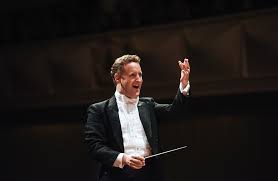All-modern, all-Russian program gets off to a powerful start in Friday's ISO concert
 |
| Michael Francis is visiting again this weekend. |
Presumably, Russia's continuing assault on Ukraine was responsible, but it's hard to see why some authentic 20th-century products of the Russian muse should fall victim, in a marketing sense, to Vladimir Putin's 21st-century tyranny and aggression.
Guest conductor Michael Francis gave excellent program notes from the stage Friday night before the concert's replacement headliner, Sergei Rachmaninoff's Symphonic Dances. Along with Sergei Prokofiev and Sofia Gubaidulina, the program's other composers, Rachmaninoff's life was deeply affected by the Soviet era, largely in a way comparable to Putin's apparent desire to emulate Josef Stalin in internal repression and external power games.
Francis' informative overview raised the question again: Why couldn't this program have remained "Greetings from Russia" in its appeal to the public? Unlike others in this series, all the composers represented were from the country being saluted, not just waving a hand in tribute to its culture.
A native of Britain, since 2019 an American citizen living with his family in Florida, Francis has made a clear-cut impression as a man with the technique and the artistic vision capable of leading the ISO on a more regular basis. He did so with an all-American program in 2017. But his standing in the ISO's search for a new music director is unknown to me.
It could be that the most exciting, keenly focused concert experience to be had in Indianapolis this weekend is how the ISO performs Rachmaninoff's Symphonic Dances under Francis' baton. I can't say for sure, and I don't cover all musical genres and formats, but there was unparalleled energy and vitality in this final orchestral statement from the much-loved composer's pen. Hilbert Circle Theatre is the place to be this afternoon.
Long struggling for high-level admiration as a composer as modernism seems to have been stamped as a historical necessity, Rachmaninoff based his exile in the West on his superb achievement as a concert pianist. Symphonic Dances was his major hail and farewell to the lost world that nurtured him.
It may be a stretch to headline this review suggesting that this weekend's program is "all-modern" as well as "all-Russian," but Symphonic Dances shows the composer's absorption of his musically adventurous times beyond what he produced before the Revolution prompted departure from his homeland. There's an edginess that seems impelled by more than the romantic afflatus that generated the piano concertos and the symphonies, especially the beloved No. 2 of each form. In the work reviewed here, there is also a wealth of orchestral color, which tends to be underestimated in early Rachmaninoff. One of the early reviews during the vogue for Lowell Liebermann in the 1990s made an invidious comparison to the effect that Liebermann's style resembled Rachmaninoff's, but with good orchestration.
 |
| Kevin Lln brought out the spiky magic of Prokofiev. |
Sitting in the concertmaster's chair, unusually so when the concertmaster is featured as concerto soloist, was Kevin Lin. Maybe he really likes the piece, and who can blame him? His presence helped give shape and direction to the orchestra in partnership with Francis. The collegiality was evident in the hug the two men exchanged at the end of Prokofiev's Violin Concerto No. 1 in D major.
The fiendishly difficult work found the soloist fit for all demands. Perpetual-motion passages have their contrast in heart-melting lyricism, and there are touches of humor in Prokofiev's endearing, if smart-aleck manner. The solo part shares these qualities with a busy, alert orchestra, and that's what the ISO was throughout. Lin displayed the ingratiating manner of a work that sometimes seems too aggressive about wanting to be liked.
These concerts open with a somewhat conservative but still characteristic work by the true modernist
 |
| Sofia Gubaidulina is in the forefront of living Russian composers. |
Sofia Gubaidulina, who celebrated her 90th birthday last October. "Fairytale Poem" comes in at just under a quarter-hour as it captures a Czech folktale called "The Little Chalk." The story gives a personality and a destiny to the classic blackboard writing tool that was known to generations of schoolchildren around the world. The piece puts eloquent characterization into a small group of clarinets, as the sometimes mysterious ensemble of strings carries the evolution of the anthropomorphic chalk forward. The work is both surprising and comforting in how it fleshes out the fanciful tale, and, gathered in chamber-orchestra form, the ISO played it brightly under Francis' guidance.
ISO CEO James Johnson was pressed into service in advance, telling the audience the plot of "Fairytale Poem." He also dedicated the concert to the memory of Herman Whitfield III, an Indianapolis pianist-composer who died here in police custody April 25.



Comments
Post a Comment